Wisconsin's famed Horicon Marsh is a prime example of how wetlands help connect people with nature and their communities

By Chris Sebastian
Photos by Mike Roemer
Wetlands serve as natural community centers of sorts for millions of people across North America. Marshes, estuaries, shallow lakes, and other wetlands are popular recreation areas for a variety of outdoor enthusiasts. A prime example of a wetland that is treasured by people from all walks of life is southeast Wisconsin's 32,000-acre Horicon Marsh. The largest freshwater cattail marsh in the nation, Horicon hosts more than 400,000 people annually for activities such as hunting, fishing, kayaking, bird-watching, and environmental education programs. Two-thirds of this publicly owned wetland is managed by the U.S. Fish and Wildlife Service (USFWS) and the remainder by the Wisconsin Department of Natural Resources (DNR). Ducks Unlimited has an extensive conservation history here, having helped these agencies protect, enhance, or restore more than 10,000 acres of the marsh over the past 25 years.
Horicon Marsh has immense waterfowl habitat value, supporting the largest nesting population of redheads east of the Mississippi River and impressive numbers of staging Canada geese, dabbling and diving ducks, and other migratory birds in spring and fall. "There's a reason Horicon Marsh was designated as a Ramsar Wetland of International Importance, and I am proud to work alongside our partners to help enhance this tremendous resource," says Brian Glenzinski, DU regional biologist in Wisconsin.
Following are six stories of people whose lives are closely tied to Horicon's cattails and clean water. These stories aren't unique to Wisconsin. Like-minded individuals enjoy wetlands across the continent, from north to south and coast to coast.
From vast permanent marshes to tiny potholes of less than an acre, wetlands are cherished by waterfowlers. Longtime DU supporters George Olson and Don Jago created a lifetime of memories while hunting together for decades on Horicon Marsh. In their younger days, they crossed the marsh's dense stands of cattails using a unique Wisconsin invention—marsh skis—which enabled them to reach hidden openings and channels that were inaccessible to other hunters.
"I hunted this marsh for 65 years," Jago says. "I had the chance to live anywhere in the state when I retired, and I ended up moving 10 minutes away. I thought to myself, 'I can't go anywhere else.' For years and years I thought this marsh belonged to me."
For Olson, Horicon offers Canada goose hunting in the fall and plenty of other adventures throughout the year. "The marsh gives me plenty of opportunities for recreation, whether it's fishing for northern pike, going for a canoe ride, or hunting waterfowl or deer," he says. "And when the conditions are right, you can even bring your family here to ice-skate in the winter."
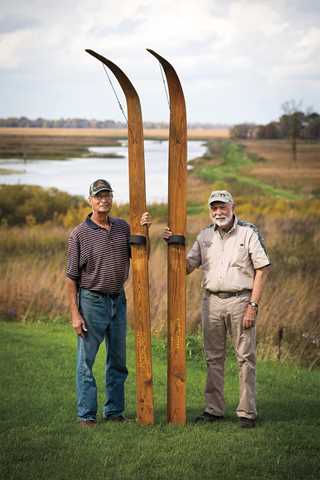
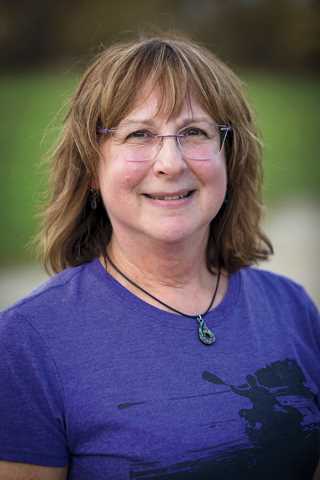
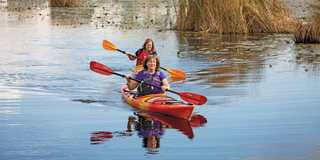
Sitting low in her 13-foot kayak, JoAnne Neuman leaves little wake as she paddles silently through the marsh on a warm October afternoon. A Horicon regular, Neuman is one of hundreds of people who explore the marsh's myriad coves, cutouts, and channels in stealthy watercraft.
"The sounds are incredible," Neuman says. "My favorite things are the pelicans when they fly overhead. But the calmness, once you get away from the noise, it's pretty quiet out there."
Neuman joins a group of 15 paddlers who take monthly guided tours of the marsh. "We use Horicon quite a bit because it's in our backyard. Every time I take a guided trip, I learn something different," she says.
Paddle sports are among the fastest-growing forms of outdoor recreation in the United States, and wetlands are magnets for local paddlers, notes Christopher Stec, chief operating officer of the American Canoe Association. "Wetlands allow paddlers to enjoy nature in a variety of ways, including hunting and fishing from your boat. Paddling your canoe, kayak, or stand-up paddleboard through wetlands helps raise awareness about the importance of protecting and preserving these ecologically important areas," Stec says.
Neuman has her own reasons for supporting efforts to keep Horicon Marsh healthy. "Clean water is very important to paddlers," she says. "In a kayak, you are in contact with the water all the time."
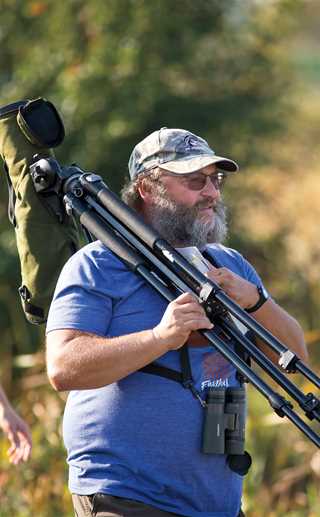
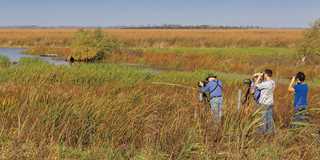
On a cool fall morning a half dozen binocular-wearing friends carefully observe a group of waterfowl swimming where open water meets thick vegetation. They are members of the Horicon Marsh Bird Club, and they rattle off the name of each species they identify. Wetlands large and small attract resident and migratory birds, which in turn attract people who enjoy observing them.
"We have documented 309 species of birds in and around the marsh," says club president Jeff Bahls. "It's the go-to spot for marshland birds. It's what people expect at Horicon."
According to the USFWS, more than 45 million people enjoy watching birds, and many DU project sites are birding hot spots. At any given time the Horicon Marsh Bird Club has between 60 and 80 members, mostly couples, who keep in touch year-round. This camaraderie has helped form connections and friendships across the community.
Birders have a great appreciation for healthy wetlands. "Habitat is everything," Bahls says. "The shorebirds that come here have no idea that this habitat was conserved primarily for ducks or that the enhancements that keep water levels suitable for least bitterns were made for redheads."
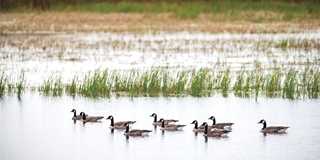
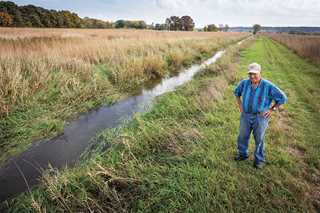
Al Messner farms on the northeast end of Horicon, living in a newer home next to the old farmhouse where he was born 77 years ago. As Messner drives the roads near the homestead, he points out fields that three generations of his family have owned, farmed, and conserved. His grandfather sold part of his farmland to the USFWS to expand Horicon Marsh in the early 1940s.
Having grown up on the edge of the marsh, Messner appreciates the role wetlands play in maintaining and improving water quality. He has enrolled some of his land in the Farm Bill's State Acres for Wildlife Enhancement Program, which helps landowners conserve crucial wildlife habitats on high-priority landscapes. With assistance from the U.S. Department of Agriculture, he plants buffer strips of native vegetation along the drainage ditches on his farm. These buffer strips help reduce levels of sediment and nutrients in agricultural runoff.
"The fertilizers that we spread on our farms used to go right into the ditches. That bothered me," Messner says. "Since we've planted the buffer strips, the water flowing into the marsh is much cleaner and we see a lot more birds and pollinators."
Erv Lesczynski, Rock River Watershed planner with the Fond du Lac and Dodge Counties Land and Water Conservation Departments, works closely with Messner and other farmers to conserve wildlife habitat and improve water quality in Horicon's watershed. "Farmers know that no one is making land anymore, and the ground they are working today will have to provide their kids and grandkids with the resources they will need in the future, including clean water," Lesczynski says.
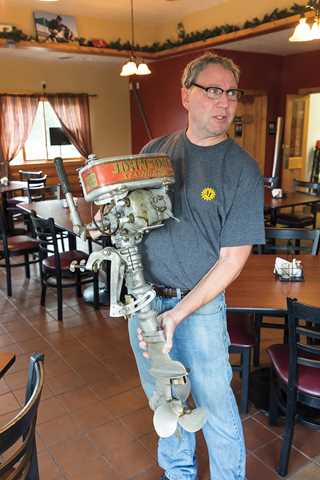
Thirty years ago, Rock River Tap was frequented mainly by workers from the nearby John Deere factory. But in recent years the popular restaurant and bar, which is located in the community of Horicon, has gotten a lot busier thanks to the tourism centered around the marsh. "Fully one-third of my customers are people from outside the county who come here to take advantage of the marsh," says Rock River Tap owner Bob Carpenter.
Hotels, restaurants, sporting goods stores, gas stations, and many other businesses reap financial rewards from having healthy wetlands nearby. Some of those businesses are able to give back to the resource by supporting DU's conservation work. In 1945, Ted Bachhuber cofounded Mayville Engineering Company (MEC). Bachhuber was an avid trapshooter, and in 1955 his company developed a shotgun reloader that quickly became an essential piece of equipment for clay target shooters and hunters, says Robert Kamphuis, the company's president, chief executive officer, and chairman. Over the years that followed, MEC grew to become one of the largest manufacturing companies in the United States.
The Ted and Grace Bachhuber Foundation was founded in 1982, and conservation is an important part of its mission. In 2015, the foundation made a $500,000 gift to Ducks Unlimited and also issued a $500,000 challenge grant, which was met by 72 DU Major Sponsors in a little over two years. DU paired the grant with numerous other county, state, and federal funding sources. These funds were used to protect land adjacent to Horicon National Wildlife Refuge and Horicon Marsh State Wildlife Area, and to restore watershed habitats, control invasive species, and enhance wetland management in the marsh.
"Horicon is vital to water quality and wildlife habitat in this area, and the Bachhuber Foundation has had a huge impact on the conservation efforts that go on in and around the marsh," Kamphuis says.
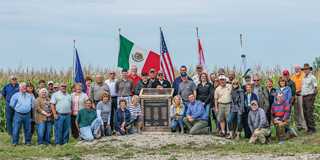
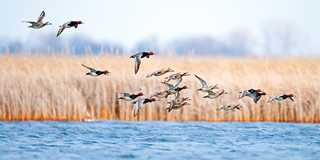

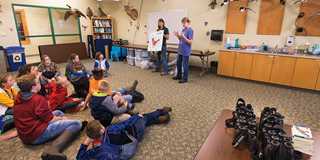
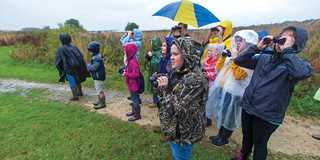
Just as waterfowlers enjoy settling into a marsh at sunrise, kids love getting their hands dirty while learning about wetlands and wildlife. Judy Acker, who teaches at St. Peter's Lutheran School, brings her students to Horicon Marsh each year on a field trip. During these outings, Wisconsin DNR educational staff lead the students on interactive hikes and wetland learning sessions.
"We teach them to understand that what they do affects Wisconsin, and I want them to become conscientious residents of their state and the world," Acker says. "I want to take the kids to a place where they can make that connection, and this marsh is a wonderful place to teach that."
Liz Herzmann, Wisconsin DNR wildlife educator at Horicon, says the marsh is an important attraction for the local community. "Our goal is to try to foster appreciation for the resources residents have right in their backyards," she says. "It's fantastic when you have public land nearby that gives you so many opportunities, whether you enjoy taking photos, kayaking, hiking, or just getting a little exercise."
Wetlands across the country play host to senior groups, families, and school trips like Acker's. Fifth-grade student Jacob Danielson spent the morning exploring models of water-control structures, examining animal pelts, and watching waterfowl and other birds trading over the marsh. "It was really cool to see a muskrat house and the whole marsh and the animals that live there," he says.
See a full photo gallery from Horicon Marsh.
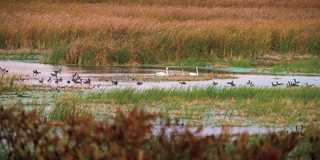
Coalition Bands Together for Wisconsin Wetlands
In Wisconsin, conservationists recently founded a new advocacy group dedicated to protecting wetlands like Horicon Marsh. The Sportsmen for Wetlands coalition was formed in 2018 by a group of state and national organizations with a shared interest in conserving Wisconsin's wetland resources. Ducks Unlimited is a founding member of the group along with the Wisconsin Wetlands Association, Wisconsin Waterfowl Association, Wisconsin Wildlife Federation, Pheasants Forever, and Trout Unlimited Wisconsin.
The mission of Sportsmen for Wetlands is to engage Wisconsin's hunting, angling, trapping, and conservation communities in proactive and collaborative efforts that promote wetlands education and conservation advocacy. "We've worked together before, and now we are partnering for the first time for wetlands directly," says Erin O'Brien, policy programs director for the Wisconsin Wetlands Association. "We're finding a new avenue for people to engage with their lawmakers to tell them how wetlands are important to us all."
Sportsmen for Wetlands hopes similar groups will be formed in other states to raise awareness about the ecological and economic importance of wetlands. For more information, visit facebook.com/sportsmenforwetlands.
Ducks Unlimited uses cookies to enhance your browsing experience, optimize site functionality, analyze traffic, and deliver personalized advertising through third parties. By continuing to use this site, you agree to our use of cookies. View Privacy Policy